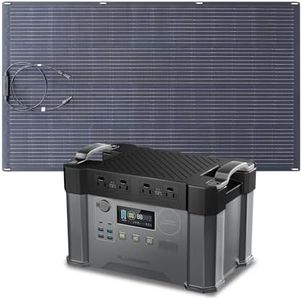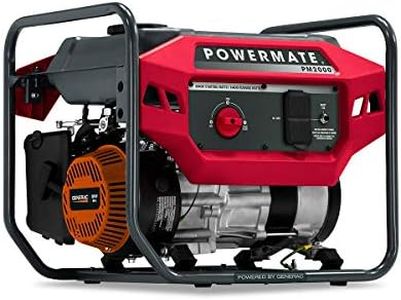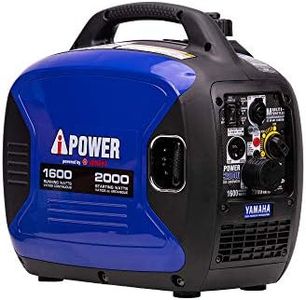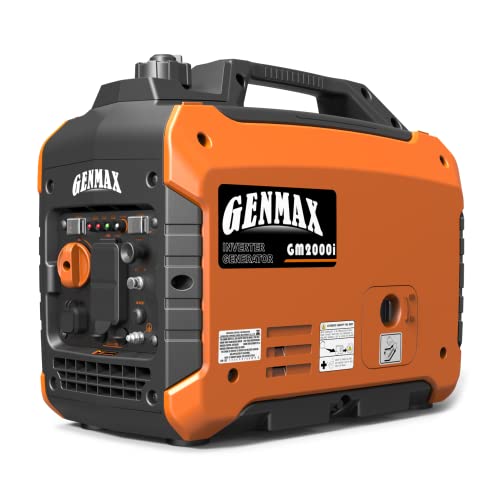7 Best 2000 Watt Generators 2025 in the United States
Our technology thoroughly searches through the online shopping world, reviewing hundreds of sites. We then process and analyze this information, updating in real-time to bring you the latest top-rated products. This way, you always get the best and most current options available.

Our Top Picks
Winner
Generac 2,500-Watt Gas Powered Portable Inverter Generator - Compact and Lightweight Design - Produces Clean, Stable Power - COsense Technology - Perfect for Home use - Orange/Black
Most important from
1268 reviews
The Generac GP2500i is a solid option for anyone seeking a portable inverter generator, especially for outdoor activities like camping and tailgating. One of its notable strengths is its ability to deliver clean and stable power, thanks to TruePower Technology. This feature makes it safe for sensitive electronics, which is a significant advantage if you plan to power devices like smartphones or laptops.
Portability is another strong point; weighing just 48 pounds, it’s lightweight and comes with a built-in handle, allowing for easy transport. Additionally, the compact size and design enable you to set it up in tight spaces without any hassle. The generator also shines in terms of fuel efficiency and noise reduction. With Economy Mode, it adjusts engine speed to save fuel while minimizing noise, making it a great companion for social gatherings or quiet evenings in nature.
On the safety front, the GP2500i includes COsense Technology, which stops the generator if it detects hazardous carbon monoxide levels, providing peace of mind during use. However, there are some trade-offs to consider. While it has a running wattage of 2200 watts and a starting wattage of 2500 watts, this may be limiting for users who need to power larger appliances simultaneously. Additionally, while it features a USB port for device charging, the total number of outlets (three) might not be sufficient for those needing to plug in multiple devices at once. Some users may also find the price point higher compared to non-inverter generators, which might be a consideration for budget-conscious buyers.
The Generac GP2500i is a reliable choice if you value portability, quiet operation, and clean power, but you may want to assess your specific power needs and the number of connections required before making a decision.
Most important from
1268 reviews
Honda EU2200ITAN 2200-Watt 120-Volt Super Quiet Portable Inverter Generator with CO-Minder - 49-State
Most important from
967 reviews
The Honda EU2200ITAN is a robust portable inverter generator that stands out in the 2000-watt generator category. With a power output of 2200 watts, it delivers about 10% more power than its predecessor, the EU2000i, making it suitable for running a variety of tools and appliances, which is a significant advantage for users needing reliable power. It's powered by gasoline and offers a runtime of up to 8 hours on a single tank, which is quite satisfactory for most outdoor activities or emergencies.
One of the real strengths of the EU2200ITAN is its portability; weighing in at 44 pounds and featuring a compact design, it's easy to transport, making it ideal for camping, tailgating, or emergency backup. Additionally, it operates quietly, which is a huge plus when noise is a concern, especially in residential areas or natural settings. Its CO-Minder technology is an excellent safety feature that monitors carbon monoxide levels, ensuring safer use.
There are some drawbacks to consider. While it performs well, the fuel tank's capacity is only 1 gallon, which can limit its runtime, especially if you plan to power larger appliances continuously. Users may need to refill the tank more frequently than with larger generators. Additionally, while it has multiple outlets, if you're looking for extensive connectivity options, you might find it somewhat limited compared to other models in the market.
Most important from
967 reviews
YAMAHA EF2200iS Inverter Generator, 2200 Watts, Blue
Most important from
134 reviews
The Yamaha EF2200iS Inverter Generator stands out in the 2000-watt generator category with its respectable power output of 2200 watts, making it suitable for a variety of uses such as camping and outdoor activities. Its powerful 79cc engine not only delivers reliable performance but also ensures efficient fuel usage. One of the key strengths of this generator is Yamaha's Quiet Technology, which significantly reduces noise levels, allowing for a more pleasant experience during use, especially in quiet settings like campgrounds.
Portability is another strong point, with a weight of 55.2 pounds that makes it manageable for transport. The illuminated multi-function LED display gives users easy access to generator status, ensuring they can monitor performance effectively, even in low light. The inclusion of multiple outlets, like the standard RV outlet and a DC outlet, adds versatility, allowing users to connect different devices without the hassle of additional adapters.
There are a few points to consider. While its runtime of around 10 hours is commendable, users may find that under heavier loads, the running wattage of 1800 watts might limit the number of appliances they can power simultaneously. Additionally, while it is generally quiet for a generator, some users might still perceive it as louder compared to other options in the market. The 3-year warranty is a good assurance of quality, but considering Yamaha’s premium pricing compared to other brands, potential buyers should weigh their budget against the features and reliability offered. The Yamaha EF2200iS is an excellent choice for those seeking a robust yet quiet generator mainly for outdoor use, though it may be slightly less powerful than some might expect under heavier loads.
Most important from
134 reviews
Buying Guide for the Best 2000 Watt Generators
When choosing a 2000-watt generator, it's important to consider your specific needs and how you plan to use the generator. Whether you need it for camping, as a backup power source for your home, or for work on a job site, understanding the key specifications will help you make an informed decision. Here are the key specs to consider and how to navigate them to find the best fit for you.FAQ
Most Popular Categories Right Now


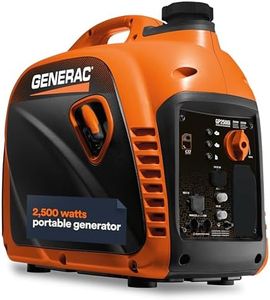
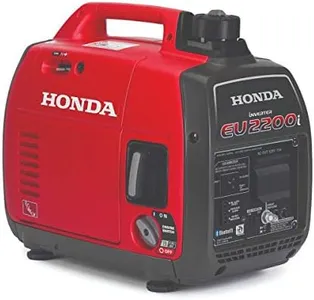
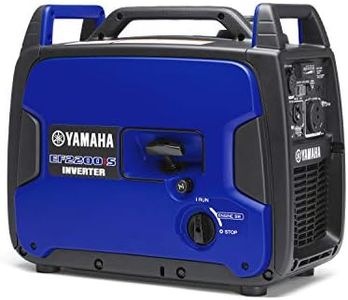
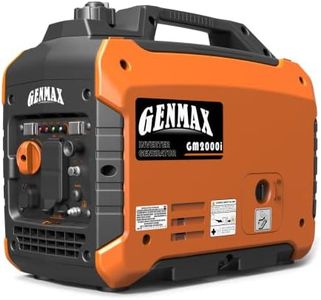
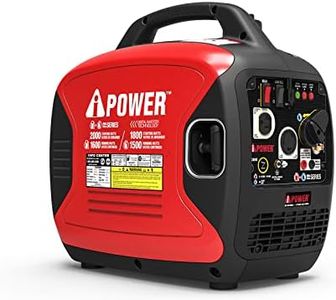
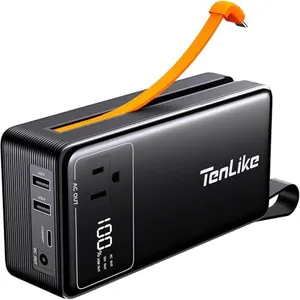
![[Upgraded Version] ALLPOWERS S2000 Portable Power Station 2000W (Peak 4000W) MPPT Solar Generator 1500Wh Backup Battery with 4 AC Outlets for Outdoor Camping RV Emergency Off-Grid](https://images-proxy.bestreviews.guide/U7St6iTGtTeriCQwY--4g70cGmI=/0x300/https://m.media-amazon.com/images/I/31g7wSEKaOL._AC_CX679_.jpg)

